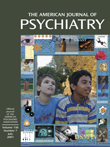Reformulating the Diagnosis of Schizophrenia
To the Editor: The article by Ming T. Tsuang, M.D., Ph.D., D.Sc., F.R.C.Psych., et al. (1) represents a courageous attempt to redefine the nosology of schizophrenia. The authors favor the concept of schizotaxia and encourage the formulation of diagnostic criteria for this entity. Our group, which has been actively working on psychophysiology in patients with schizophrenia and their first-degree relatives, has encountered findings that bolster the concept of schizotaxia. In a recent study (2), we measured “bereitschaftspotential” (a cognitive-evoked potential evaluating motor preparation in a voluntary self-paced paradigm) in patients with schizophrenia, their nonpsychotic first-degree relatives, and healthy comparison subjects. Neurological signs, both soft and hard, were also assessed in these groups. The abnormality in bereitschaftspotential as well as the neurological abnormalities in the first-degree relatives were greater than those for the healthy comparison subjects but less than those for the patients. Moreover, in what we believe to be the first study of its kind, we attempted to find correlations between bereitschaftspotential and neurological abnormalities and obtained significant positive correlations between these two substrates. In addition, negative symptoms in patients with schizophrenia showed significant correlations with both abnormal bereitschaftspotential and neurological signs, which indicate a common etiopathological process underlying these features. As conceptualized, negative symptoms, neurological signs, and neuropsychological impairment represent the constituents of schizotaxia. Bereitschaftspotential is a psychophysiological measure of movement planning and decision making in voluntary movement paradigms and thus represents the neurophysiological counterpart of neuropsychological impairment. Bereitschaftspotential and other cognitive-evoked potentials have been studied across various psychiatric populations, but there is a dearth of studies comparing patients with schizophrenia and their first-degree relatives. Hence, such studies are encouraged to improve our understanding of the concept of schizotaxia.
Regarding the constituent features of the proposed entity of schizotaxia, we add a caveat. Neurological signs, negative symptoms, and even brain abnormalities are not limited to schizophrenia. For example, a study (3) demonstrated that poverty of speech, a negative symptom, is associated with a smaller perfusion of the left dorsolateral prefrontal cortex in depression and schizophrenia in a manner that is independent of diagnosis. Hence, we support the authors’ proposal of field trials with adequate specificity and sensitivity to discern abnormalities before their inclusion in the diagnostic criteria for schizotaxia. In this scenario, cognitive-evoked potentials represent an area that calls for further exploration.
1. Tsuang MT, Stone WS, Faraone SV: Toward reformulating the diagnosis of schizophrenia. Am J Psychiatry 2000; 157:1041-1050Google Scholar
2. Duggal HS, Nizamie SH, Kumar PK, Jahan M: Bereitschaftspotential and its neurological correlates in schizophrenia, in Current Developments in Schizophrenia. Edited by Mandal MK, Nizamie SH. New Delhi, Allied Publishers (in press)Google Scholar
3. Dolan RJ, Bench CJ, Liddle PF, Friston KJ, Frith CD, Grasby PM, Frackowiak RSJ: Dorsolateral prefrontal cortex dysfunction in the major psychoses: symptom or disease specificity? J Neurol Neurosurg Psychiatry 1993; 56:1290-1294Google Scholar



